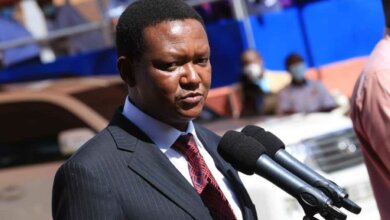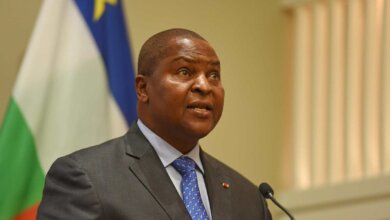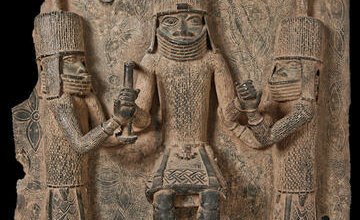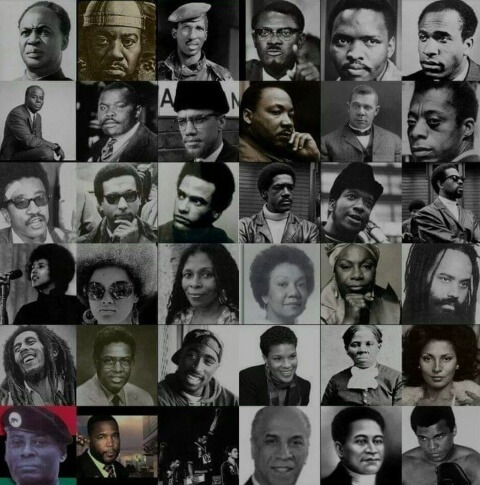Boko Haram Fight Hastens Obama’s Thaw Toward Nigerian Leader
Muhammadu Buhari, the former strongman elected president of Nigeria in April, seeks to mend ties with the U.S. as he meets at the White House with President Barack Obama to discuss combating extremism in Africa.
As the Boko Haram militant group runs amok in Nigeria’s north, Obama views the peaceful transfer of power to Buhari as an opportunity to bolster the U.S. fight against terrorism, aid economic growth in the country and reduce human-rights abuses. Later in the week, Obama travels to Kenya and Ethiopia, which face threats from Somalia-based militants.
Buhari, who purged the Nigerian military’s top commanders last week, is seeking U.S. advice and cooperation in rolling back Boko Haram. His administration also wants support for Nigeria’s ailing economy, as Africa’s largest oil exporter suffers from a decline in oil prices, a surge in piracy and competition from U.S. shale production.
“Nigeria is by far the most important country in Africa, from north Egypt all the way to south South Africa,” said Johnnie Carson, Obama’s former assistant secretary of state for Africa affairs. “It’s in our interest to be better trading partners, it’s in our interest to be better security partners and it’s in our interest to work to promote deeper political and human rights around the continent.”
The Obama administration may offer new military training and intelligence assistance to support Buhari’s fledgling government, Carson, a fellow at the United States Institute of Peace in Washington, said in an interview.
“The fact that he’s visiting less than eight weeks after taking office is historic in and of itself,” Grant Harris, a senior director for Obama’s National Security Council, told reporters on Friday. “We’re looking forward to what we can do with a president who has staked out an agenda which we think is the right agenda at the right time.”
Business leaders, meanwhile, are watching the meeting for signals of improved relations between the U.S. and Africa’s largest economy, said John Kilduff, an oil trader with Again Capital.
Corruption, insecurity and political instability have restricted foreign investment in Nigeria. The largely violence-free election of Buhari, 72, who unseated incumbent Goodluck Jonathan with an anti-corruption platform, is improving the atmosphere.
“Everybody in the oil market has got their eye on things being straightened up there for renewed investment,” Carson said in a telephone interview. “I wouldn’t be surprised if there was some measure announced or goals set for increasing trade or aid to Nigeria, or maybe even encouragement of U.S. oil companies getting back in there.”
Companies with operations in Nigeria include Irving, Texas-based Exxon Mobil Corp.; Royal Dutch Shell Plc, based in The Hague; and San Ramon, California-based Chevron Corp.
The fight against Boko Haram will be at the top of the agenda during Buhari’s four-day visit to Washington, which will include meetings with U.S. military leaders. Boko Haram has sought to impose Islamic sharia law in Nigeria for six years in a campaign of violence that has killed more than 17,000 people, according to Amnesty International.
Boko Haram has claimed responsibility for scores of bombings, shootings and kidnappings, and in March pledged allegiance to Islamic State. It has intensified attacks in recent weeks.
About 1.4 million people have been displaced by the conflict. Eleven people were killed on Friday in suicide bombings in the northeastern city of Damaturu as Muslims gathered for prayers to mark the end of Ramadan.
Boko Haram has also succeeded in driving a wedge between the U.S. and Nigeria, as the two governments squabbled over how to combat the group. The U.S. blocked the sale of helicopter gunships to Nigeria over allegations its military committed human-rights abuses in areas where Boko Haram operates, and Nigeria abruptly ended a U.S. mission to train its troops to fight the group in December.
In November, Nigeria’s ambassador to the U.S. openly accused the Obama administration of failing to provide adequate military support in remarks posted to the embassy’s website.
The U.S. welcomed the election of Buhari after growing levels of “tension and frustration between Abuja and Washington,” Carson said. The Obama administration sees an opportunity to repair ties with the world’s seventh-most populous nation, he said, pointing to a series of recent U.S. overtures.
Buhari’s White House visit comes just six weeks after he met with Obama as a special guest during a meeting of the Group of Seven developed countries in Germany. While in Washington, the former military dictator will discuss security with Joint Chiefs of Staff Chairman Martin Dempsey, Vice President Joe Biden and Attorney General Loretta Lynch.
Buhari will get to make his case for more economic aid during meetings with Treasury Secretary Jacob J. Lew and U.S. Trade Representative Michael Froman.
“Nigeria is battling a number of economic crises, and it’s the United States’ largest trading partner in Africa,” Michael Clyne, a senior analyst for the security consultancy Drum Cussac, said in a telephone interview. “Years ago it ranked as one of the top oil exporters to America.”
The U.S. shale boom has affected Nigeria more than any other country, Kilduff said. U.S. imports of crude oil from Nigeria have fallen to 48,000 barrels a day in May, according to the latest data from the U.S. Department of Energy. As recently as 2010, the daily average was about 1 million barrels.
Buhari will also address the U.S. Chamber of Commerce and the Corporate Council for Africa while in Washington, his office said.
Source: Toluse Olorunnipa/Bloomberg
Oral Ofori is Founder and Publisher at www.TheAfricanDream.net, a digital storyteller and producer, and also an information and research consultant.





